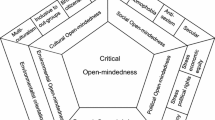Abstract
I have been promoting critical open-mindedness throughout this book, and have attempted to trace its history, but there are probably certain objections that have been raised in the reader’s mind. In this chapter, I shall attempt to defend critical open-mindedness from typical objections, and then move on to outlining how critical open-mindedness can be cultivated, both in individuals and societies.
Access this chapter
Tax calculation will be finalised at checkout
Purchases are for personal use only
Preview
Unable to display preview. Download preview PDF.
Similar content being viewed by others
Notes
Mather, G. (2009). Foundations of Sensation and Perception.
Hendricks, D.I. et al. (2001). The relative frequency of unsafe driving acts in serious traffic crashes: Summary technical report. US Department of Transportation. Retrieved from http://www.nhtsa.gov/people/injuy/research/UDAshortrpt/UDAsummtechrept.pdf, 22 August 2013.
Scheffler, I. (1967). Science and Subjectivity, p. 118.
Scheffler (2009). Worlds of Truth, p. 15.
Lord, Lepper, and Preston, (1984). Considering the Opposite: A Corrective Strategy for Social Judgment.
Smith and Tyler (1996), cited in Gaertner and Dovidio (2000). Reducing Intergroup Bias.
Author information
Authors and Affiliations
Copyright information
© 2014 John Lambie
About this chapter
Cite this chapter
Lambie, J. (2014). Defending and Cultivating Critical Open-Mindedness. In: How to be Critically Open-Minded — A Psychological and Historical Analysis. Palgrave Macmillan, London. https://doi.org/10.1057/9781137301055_12
Download citation
DOI: https://doi.org/10.1057/9781137301055_12
Publisher Name: Palgrave Macmillan, London
Print ISBN: 978-1-349-45338-2
Online ISBN: 978-1-137-30105-5
eBook Packages: Palgrave Social Sciences CollectionSocial Sciences (R0)




